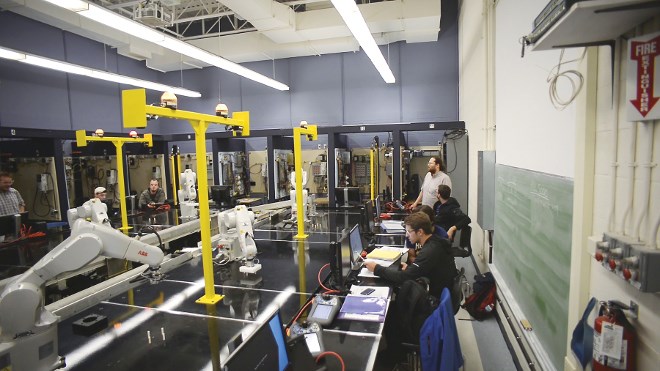A sophisticated robotics lab at Sault College is providing training for students and meeting the needs of industry through applied research applications.
Construction on the Sault Ste. Marie facility began in 2014 with $150,000 in funding from the National Sciences and Engineering Research Council of Canada (NSERC), and proceeded in stages as funding became available, said John Coccimiglio, manager of applied research and innovation at Sault College.
After the lab was initially established, the college quickly realized its limitations: its industrial robot could be tied up for an applied research project for months at a time, leaving it unavailable for the training or post-secondary program.
Then in 2015 more funding — $450,000 from FedNor and $310,275 from the Northern Ontario Heritage Fund Corp. — helped push the lab to its next stage: the purchase of six industrial robots and related software. It allowed the lab to offer all three services simultaneously.
“We can teach process automation, we can do applied research projects for industry, and we can also do training for industry,” Coccimiglio said.
“So if a company needs training for their employees, we can come up with custom training programs.”
This coming September, the school will launch a new, two-semester graduate certificate program in robotics that will enhance the skills of students who already have a degree or diploma in a related program.
Coccimiglio said the new program will be ideal for people like mechanical technicians, electrical technologists, mechanical engineers, or others who might have some work experience with robotics but no formal training, or those for whom robotics wasn’t an option when they went through their original training.
Adding a robotics endorsement to their resumes will make those employees that much more employable, he added.
“Robotics is one of these technologies that’s disrupted, and we’re going to see in the next five years it’s really going to take off,” he said. “If you’re going to get involved in manufacturing, then having a process automation background with a robotics endorsement would be a very powerful skill set for the future.”
The school undertook its first applied research project last May with Pollard Banknote Ltd., a Sault company that supplies lottery scratch tickets to customers around the globe.
Sault College helped Pollard to automate the process of packaging their tickets for distribution, with the goal of reducing their costs, taking on more market share, and growing the operation.
“The automation of the packaging is really going to help them do that, and they plan to introduce another production line and take on more market share and hire more people, so it's not like people will lose their jobs,” Coccimiglio said.
“They will grow as a company and continue to thrive in that market space and result in more economic activity in Sault Ste. Marie.”
Despite not having any robotics training, students were able to be involved in the project because of their extensive skills and training in process automation, a program the college has offered for more than 40 years.
Coccimiglio said any company can use the facility to develop and conduct trials of different technologies, all offline, and have it fully optimized before they even purchase the equipment.
“For any company, the applied research collaboration with the college in robotics in automation is fantastic because it's all offline, so it's not intrusive in their process,” Coccimiglio said.
“That's one of the big problems: when you're managing a plant, you don't want to just go and try new technology and install it and try to refine it while you're in production, because you can't afford the downtime. So you have to make sure that it's all debugged before you put it in.”
Through its new robotics program, Sault College is also ensuring that, once companies have the technology in place, they’ll also have trained, skilled professionals who can program and troubleshoot the robots.
“With the program we have here, our grads will all have those skills, so you’ll be able to hire someone local in Sault Ste. Marie that has a strong process automation background and also has the robotics capabilities to help you with your equipment,” he said.
Coccimiglio said following the Pollard project, the company started on a new initiative with Heliene, a local company that manufactures photovoltaic solar panels, in January. Other projects are in development.




